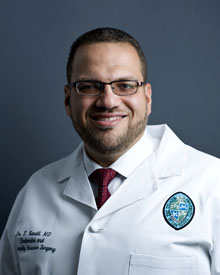Surgeon Pioneers "Scarless" Thyroid Surgery
Tulane surgeon Dr. Emad Kandil is one of the first in the country to perform a new form of endoscopic surgery that uses a small incision under the arm to remove all or a portion of the thyroid gland without leaving a scar on the neck.

Dr. Emad Kandil, assistant professor of surgery, says an exciting new operation to removed diseased thyroid tissue doesn't involve a long neck incision. (Photo from Tulane Medical Center)
The technique, which was approved by the U.S. Food and Drug Administration this past summer, uses the latest Da Vinci three-dimensional, high-definition robotic equipment to make a two-inch incision below the armpit. This allows doctors to maneuver a small camera and specially designed instruments between muscles to access the thyroid. Diseased tissue can be removed through the armpit incision.
"This is an exciting new treatment option for certain patients who need thyroid surgery but are concerned about having a visible and permanent neck scar," says Kandil, assistant professor of surgery and adjunct assistant professor of otolaryngology. "This technique safely removes the thyroid without leaving so much as a scratch on the neck," adds Kandil, who is who is chief of the endocrine surgery section.
Traditional thyroid surgery can involve a long incision at the base of the neck. Kandil performs the "scarless" thyroidectomy surgery at Tulane Medical Center. One of only a few surgeons trained in the technique, he chairs an annual symposium at Tulane to teach surgeons how to perform minimally invasive thyroid surgery.
The new technique has benefits that go beyond aesthetics. Kandil says patients report less discomfort and faster recovery times after the procedure.
The thyroid is a hormone-producing gland that regulates the body's metabolism and affects critical body functions. Thyroid surgery treats cancer, goiter, nodules or an overactive thyroid. An estimated 20 million Americans have some form of thyroid disease, according to the American Thyroid Association.
For more information call the Tulane Department of Surgery at 504-988-3589 or Tulane Medical Center at 504-988-5800.
